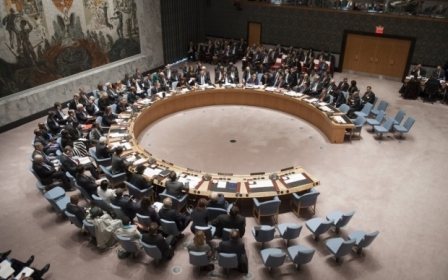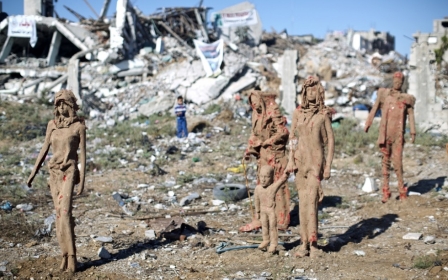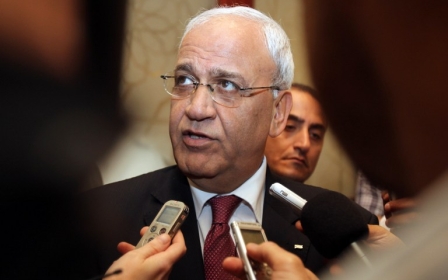Israel’s occupation 'management' is no longer an acceptable option

Israel's rightist coalition has been using business-lingo, applied to the Israeli-Palestinian conflict to make it all about "managing" the occupation. Using this terminology makes it sound harmless, administrative. And their version of the conflict is that there are no solutions but, rather, only attempts to preserve the status quo.
Defence Minister, Moshe Yaalon, said as much in mid-October: “I am not looking for a solution,” he explained. “I am looking for a way to manage the conflict and maintain relations in a way that works for our interests. We need to free ourselves of the notion that everything boils down to only one option called a [Palestinian] state.”
Meanwhile, Naftalie Bennett, economy minister and leader of the Jewish Home party, elaborated in a comment piece for the New York Times, in early November, full of flourishes of “bottom-up peace” and “economic bridges”. This is the Israeli right announcing plans to never end the occupation - and these are just a few of the comments coming from the current coalition.
This idea of “managing” the now 47-year occupation of Palestinian territories somehow imparts the suggestion of a sort of freezing of circumstances, a maintaining of things as they are - and the trouble is that nothing could be further from the truth. As Israeli analyst, Dahlia Scheindlin, says: “Things are changing all the time and not changing in the direction of helping the political framework for a solution as most western governments see it.”
Under the guise of managing a status quo, Israel’s coalition has accelerated settlement construction and expansion, all the while strengthening its grip on Area C, the part of the West Bank - some 60 percent of it - under full Israeli control. This hold on the area includes evicting Palestinians from the mostly rural areas that fall under the “C” designation. Within just a few months of 2014, some 400 Palestinians had been forced out of their Area C homes, the fastest rate in two years according to the UN.
Earlier this week, the Associated Press reported a “surge” in Jewish settlements in the occupied West Bank under Israeli Prime Minster, Benjamin Netanyahu – an increase at twice the rate of the population inside Israel proper. In the past few months alone, Israel has approved over a thousand new settlement homes in Jerusalem, fortifying the circle of Jewish settlements in the occupied east of the city. And this is, of course, a status quo, that so far has involved heightened tensions in Jerusalem, and bombing Gaza every few years - killing thousands of civilians and in the process each time reducing the Strip to rubble.
Palestinian-American political analyst, Sam Bahour, reminds us that “status quo” is an all-too-familiar cover claim for Israel’s expansionist policies, adding: “It is the official PR spin that comes out of Israel, that tries to frame things as though the status quo is not causing more damage,” he says.
After all, during the years of the Oslo peace process, the number of Jewish settlers living in the occupied West Bank and East Jerusalem increased from 262,500 in 1993, to around 520,000 today, with Israeli settlements and their infrastructure now taking up 42 percent of Palestinian land. And indeed, the peace process camouflage was employed again this year: the Israeli group, Peace Now has reported that, in the nine-months of US-brokered talks that collapsed in April, Israel had promoted 13,851 Jewish settlements, a four-fold increase over past averages.
If anything has changed this time, though, it is the international community’s appraisal of this deteriorating status quo. As the Israeli government seemingly does its best to not just bury a two-state solution, but also cover it in concrete, the West’s response has been to insist that an independent Palestinian state alongside Israel is both viable and desirable. Analysts are reading Netanyahu’s recent summoning to Rome by US Secretary of State, John Kerry, as a sign of the American administration’s exasperation with Israel’s policies.
Such exasperation is also partly what’s behind the spate of European countries - Sweden, Ireland, France, Portugal - voting to recognise the state of Palestine. It is also what informs the EU parliament’s decision to recognise the state “in principle”, through a motion that passed overwhelmingly today (17 December). Of course, recognising a Palestinian state does nothing to change the reality on the ground; Palestinians do not wake up the morning after a vote to find that Israel has left the West Bank and East Jerusalem, or ended its crippling siege on Gaza. But such development are not pure symbolism, either: they represent a clear signal to Israel, which is opposed, across the spectrum, to what are describes as “unilateral” moves, that Europe does not have infinite patience when it comes to the continuing occupation. The recognition is also, as Swedish Foreign Minister, Margot Wallstrom, said during her country’s recognition vote in October, designed to make Israel and the Palestinians “less unequal” .
So Israel’s right may be employing its usual tactics in an ever-hardening stance, but it seems as though maybe the international community is no longer falling for it.
Photo: Israeli soldiers detain a Palestinian youth in the West Bank village of Silwad, north of Ramallah, on 17 January
New MEE newsletter: Jerusalem Dispatch
Sign up to get the latest insights and analysis on Israel-Palestine, alongside Turkey Unpacked and other MEE newsletters
Middle East Eye delivers independent and unrivalled coverage and analysis of the Middle East, North Africa and beyond. To learn more about republishing this content and the associated fees, please fill out this form. More about MEE can be found here.





